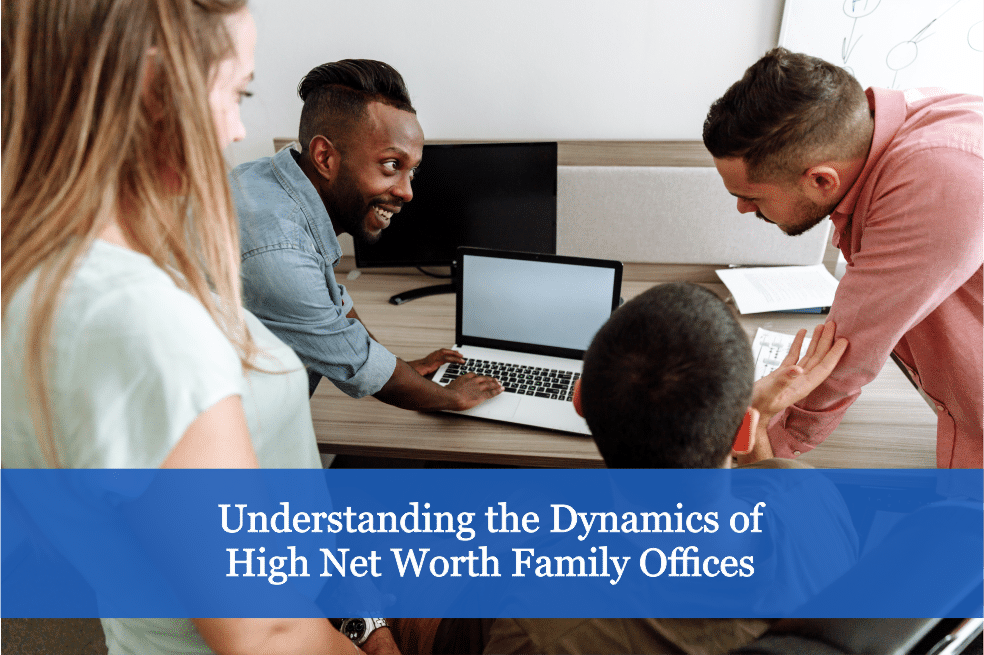For many high-net-worth families, the memory of past financial hardship often fuels a deep commitment to preserving and protecting generational wealth. This concern is particularly relevant to those managing a high-net-worth family office, where the objective extends beyond asset growth to long-term sustainability and stewardship.
A common concern among ultra-wealthy individuals is how to ensure that wealth continues to support future generations. As wealth grows, so does the complexity of maintaining it. From managing diverse assets such as real estate and municipal bonds to overseeing family-owned businesses and investment portfolios, many families face critical decisions about succession, asset oversight, and intergenerational education.

A high-net-worth family office often plays a central role in addressing these issues. These offices are designed to consolidate wealth advisory services, risk management, estate and tax planning, and succession strategies under one coordinated structure. However, one of the biggest challenges remains: preparing the next generation. Who will continue the legacy? Who understands the values, risks, and responsibilities that come with wealth? And how can future stewards be equipped to manage significant financial and operational responsibilities?
Families frequently express concerns about maintaining control over private businesses, overseeing real estate holdings, and adapting to global economic changes. Market volatility, geopolitical events, regulatory shifts, and broader economic uncertainty all contribute to the need for strategic planning and robust wealth management frameworks.
As these families consider their future, many turn to structured wealth advisory services to help protect and preserve their capital. A well-managed family office offers a strategic approach to these concerns by implementing both financial and non-financial safeguards to ensure continuity and stability.
Table of Contents
- Navigating a Volatile World
- Setting a New Trajectory
- Understanding the Dynamics of High-Net-Worth Family Offices
- Introducing the Family Office
- Currency, Purpose, and Family
- Wealth, Family, and the High-Net-Worth Family Office

Navigating a Volatile World
On October 19, 1987—Black Monday—the Dow Jones Industrial Average dropped 23% in a single day, marking the largest one-day decline in U.S. stock market history. As portfolio managers at the time, we experienced firsthand the panic and financial loss this event caused. Many investors saw millions evaporate in hours, and while many vowed to avoid repeating the same mistakes, history shows otherwise.
The reality is, financial crises will continue to occur. No one can predict when or how, but patterns repeat. Crashes are often labeled as “unprecedented,” yet disruptions like the Great Depression, the 1973 oil crisis, and 1970s inflation were all considered once-in-a-lifetime events—until the next one came along. More recently, the dot-com collapse (2000), the housing and market crash (2008), and the gold price drop (2013) all caught investors and professionals off guard.
Rather than trying to predict the next downturn, the focus should be on preparing for one. This involves proactive risk management and asset allocation strategies that act as financial shock absorbers. With the right planning, supported by experienced advisors, your portfolio, estate, and family wealth can be positioned to weather unexpected events with minimal disruption.
Looking back at the losses of 1987 and 2008, consider how they affected you and those around you. Are you prepared for the next crisis?
Even those with significant wealth are not immune to financial setbacks. Take Adolf Merckle, a German billionaire once worth over $9 billion. After a bad bet against Volkswagen during the 2008 crisis and a failed attempt to secure emergency funding, he faced a severe liquidity crisis and ultimately took his own life. His fortune wasn’t erased, but the stress of the situation was overwhelming.
Other high-profile individuals have faced similar reversals. Curt Schilling, who earned over $100 million, later reported being $60 million in debt. Mike Tyson lost nearly half a billion dollars. Kim Basinger declared bankruptcy. Musicians such as Marvin Gaye, Willie Nelson, MC Hammer, and 50 Cent experienced similar struggles. Even Michael Jackson, despite a billion-dollar contract and over 760 million records sold, faced insolvency shortly before his death, reportedly owing more than $300 million.
These stories highlight an important truth: wealth alone doesn’t guarantee protection. Without proper planning, even fortunes in the hundreds of millions can be lost. This content aims to help you and your family avoid that outcome by building a portfolio and strategy that is prepared, resilient, and built to last through future financial uncertainty.
Setting a New Trajectory
Think of this article as the beginning of a new phase—one that focuses on preserving your family’s wealth and legacy. As you read through the material, take time to highlight any insights or strategies that feel relevant to your unique financial situation. By the conclusion, you should be equipped to evaluate what changes might best serve your long-term objectives.
This process should spark meaningful conversations with your most trusted advisors. We’ve seen exceptional results when families align their investment, legal, tax, business, and personal planning efforts. That kind of collaboration enables the creation of a durable, integrated family wealth strategy—one that balances financial priorities with the personal values and goals that matter most.
Investing without a clear plan is like stepping onto a battlefield without a strategy. Every transaction—whether you’re buying or selling—assumes someone else sees the asset differently. One believes its value will rise, the other expects a decline. Without a strategy, you’re left drifting, much like a ship at sea without a rudder—at the mercy of market forces, uncertain and unprepared.

Understanding the Dynamics of High-Net-Worth Family Offices
Reaching high-net-worth status often brings a sense of achievement: “I’ve made it. I have more than enough to live comfortably and support the lifestyle I envision.” But this initial sense of security quickly gives way to a deeper awareness: “How can our family office sustain this wealth for future generations? Is conservative investing enough?” Regardless of your financial knowledge, you soon recognize that no one can master everything alone. With other areas of life requiring your time, the importance of surrounding yourself with top-tier advisors becomes clear—professionals who bring expertise where you need it most.
In our experience, growing wealth is not always the top priority for ultra-affluent families. More often, it’s about preserving family unity, living out core values, and creating a legacy through philanthropy. The essential question becomes: What are you doing with the one life you’ve been given? Wealth, for many, is a tool to pursue purpose, joy, and meaningful impact.
As wealth grows, philanthropic engagement naturally follows. High-net-worth family offices often feel a responsibility to use their resources for good, supporting causes, volunteering time, and giving generously. Once wealth reaches the hundreds of millions or beyond, personal consumption has its limits. Influential figures like Bill Gates and Warren Buffett, along with many other families, choose to give back, using their wealth to fund change that reflects their values.
Yet, despite their financial standing, many wealthy families remember leaner times—and they’re determined not to return there. One billionaire, for example, still recalls his early years on a struggling farm and the uncertainty that came with it. These memories serve as a constant reminder: wealth, without proper protection, can disappear. The fear of losing not just assets, but the freedom and opportunities they bring, remains one of the most pressing concerns for ultra-affluent families.
A high-net-worth family office is designed to address the complex financial and emotional realities that come with this level of affluence. These offices bring together specialists across disciplines—investment management, tax strategy, estate planning, and more—to provide integrated solutions that align with the family’s long-term goals.
To truly serve ultra-high-net-worth households, a family office must offer bespoke, sophisticated services that reflect the unique circumstances of each family. Advisors must prioritize transparency, minimize conflicts of interest, and build trusted networks that support multigenerational wealth. This level of coordination is essential not only for preserving wealth but for ensuring it benefits generations to come.
With wealth comes opportunity—the ability to shape your lifestyle, support your family, and make a lasting contribution to society. But without proper management, those opportunities can quickly fade. Waiting until a crisis hits is never wise. Instead, take preemptive action now to secure your future and your legacy. The peace of mind that comes with preparation is worth it.
Introducing the Family Office
For high-net-worth families, forming a family office can serve as a comprehensive solution for managing both financial and personal affairs. However, establishing a family office comes with the challenge of assembling a dedicated team of elite professionals across various disciplines—investment, legal, tax, estate, and beyond. These experts typically have long-standing reputations and full client rosters, making them highly sought-after and costly to retain. As a result, the initial cost of launching a family office—ranging from $500,000 to over $10 million annually—can seem formidable. This level of investment is usually justifiable only for families with wealth in the hundreds of millions.
Despite the cost, the benefits are extensive. A family office functions as a private management firm tailored to the unique needs of a single family. It can handle everything from investment oversight and charitable giving to insurance planning, tax compliance, estate administration, and intergenerational wealth transfer. Many family offices also provide concierge-level services—coordinating travel, managing private schooling, overseeing household operations, and hiring staff. Some even manage luxury assets like yachts, aircraft, or second homes.
The flexibility of a family office allows it to be customized around the family’s specific needs. In addition to handling day-to-day financial and administrative tasks, a family office can play a key role in preserving family values and cultivating leadership in future generations. It becomes more than just a business unit—it’s a trusted partner in managing the complexity of wealth, supporting family unity, and fostering continuity.
For families seeking a more cost-effective alternative, a multi-family office model allows multiple households to share resources, reducing costs while still benefiting from expert support. In either model, the office operates exclusively according to the family’s vision, offering highly personalized service and ensuring continuity across all facets of wealth and life management.
Ultimately, a family office is about control and peace of mind. It removes the administrative burden from family members while preserving legacy, values, and the lifestyle the family has worked so hard to build.

Currency, Purpose, and Family
One of the first questions we ask clients in a high-net-worth family office setting is: “What does money mean to you?” While initial answers are often surface-level, continued reflection tends to reveal deeper truths—insights into their values, priorities, and vision for life. Common themes emerge around the need for financial security, the freedom to make meaningful choices, and the desire to build a lasting legacy.
A 2008 article in Psychology Today emphasized that human beings rely on society to fulfill both basic and intangible needs—ranging from shelter and nourishment to identity and influence. Money, in this framework, functions as a universal social tool—an instrument through which individuals navigate their world and pursue their ambitions.
Viewed through this lens, wealth becomes much more than numbers on a statement. Whether your net worth stands at $25 million or $425 million, the figure matters far less than the possibilities it enables. So consider: Are you managing your wealth, or is it managing you? Is it expanding your freedom, or quietly limiting it? Does your wealth support family harmony, or unintentionally cause friction? Has it taken priority over personal wellness, community involvement, or spiritual growth? Is your wealth a source of peace—or of pressure?
These are questions worth revisiting often. Understanding the true role money plays in your life can reframe how you use it—and how it serves your family’s broader goals.
We recall a conversation with a client contemplating life changes. Quiet and private by nature, she surprised us by confiding her long-standing desire to move away from Atherton. She had lived comfortably for years but had delayed acting on that inner pull. With support and planning, two years later, she relocated to Carmel, where she now enjoys peaceful beach walks and watches sea otters play among the kelp. It was a simple change, but one that brought her joy, fulfillment, and a deeper connection to her environment.

Wealth, Family, and the High-Net-Worth Family Office
Still, the question lingers: what defines “enough”? You may find yourself reflecting on how much wealth is necessary to secure your family’s well-being, and at what point the surplus might be better directed toward philanthropy. Is there a threshold where continued accumulation becomes counterproductive, potentially doing more harm than good? For high-net-worth families, it’s difficult—if not impossible—to separate financial goals from family values and aspirations. Wealth can reinforce the family structure, but if not thoughtfully managed, it can also create friction.
A common concern among ultra-high-net-worth parents is that excessive wealth could diminish their children’s drive, shaping entitlement rather than ambition. But that outcome isn’t inevitable. Thoughtful families approach wealth as both a resource and a responsibility. They develop strategies to instill motivation, financial literacy, and hands-on experience in their children and grandchildren—ideally long before they assume responsibility for the family’s financial affairs.
Families that succeed in transitioning wealth across generations often follow a gradual and intentional approach. They incorporate younger members into decision-making over time, pairing real-world experience with a clear understanding of the family’s mission and values. Education plays a central role, not only academically but also in the form of structured, practical exposure to financial and business management.
The methods vary. One family might entrust a child with a defined sum—say, $500,000—as a test of financial judgment. For a family office managing hundreds of millions, that may seem like a modest amount, but it offers meaningful insight into the child’s ability to recognize opportunity, manage risk, and learn from outcomes. Not all outcomes will be successful, but both wins and missteps serve a purpose. And as parents, our role is to prepare, not to control.
One of the most common sources of tension within affluent families stems from unclear expectations. What’s often missing is a unified framework: a clearly articulated set of values that guides decision-making and behavior across generations. What principles anchor your family? What does wealth represent to you? And what legacy do you want it to carry forward?
The emotional relationship to wealth differs between those who built it and those who inherit it. The founding generation typically associates wealth with sacrifice, discipline, and hard-earned success. Their children, born into financial security, may respect those achievements but not fully understand them. Without that understanding, the next generation may struggle to develop the same resilience, and their own children may inherit more privilege than purpose.
While the first generation may create the wealth, the second and third generations bear the responsibility of sustaining it. Long-term alignment requires effort, clarity, and structure. Unfortunately, many families fall short. Studies show that approximately 80 percent of wealthy families lose their wealth by the third generation. Even with strong financial oversight, if the next generation lacks a shared sense of purpose and vision, the assets alone may not be enough to hold the legacy together.
To take steps toward preserving both your wealth and your values, explore options through these key financial directories:
Frequently Asked Questions
What net worth is typically required to set up a family office?
A multi-family office generally requires a minimum of $30 million in investable assets. For families with $250 million or more, establishing a single-family office may be more appropriate to accommodate more personalized services.
How does a high-net-worth family office differ from a wealth manager?
Wealth managers typically serve individuals seeking help with investment growth, planning, and asset protection. In contrast, a family office supports a small number of ultra-high-net-worth families by managing a wider range of complex financial and personal affairs, often including tax coordination, estate strategies, and legacy planning.
Is a family office the same as a hedge fund?
No. A family office is not a hedge fund, but it may allocate capital to hedge funds and other alternative investments. Its role is broader, encompassing investment oversight, lifestyle management, philanthropy, and multi-generational planning.
Who works within a family office?
A family office team may include financial advisors, accountants, attorneys, investment analysts, estate planners, and personal staff. Together, they coordinate to manage a family’s assets, operations, and legacy planning needs.
How much liquidity is needed to justify a family office?
Families with at least $30 million in liquid assets might benefit from a multi-family office. Those with $250 million or more may consider the more customized approach of a single-family office structure.

